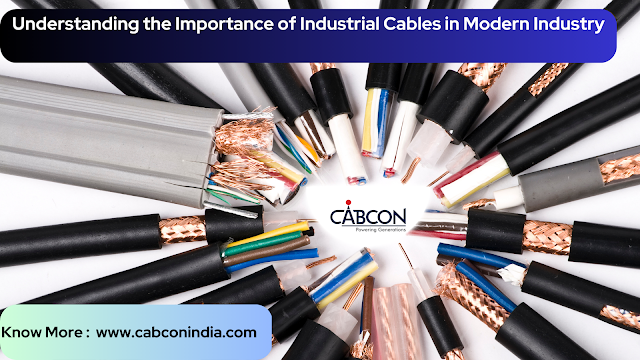Industrial cables are an essential component of modern industry. From power and control cables to instrumentation and communication cables, they play a crucial role in ensuring smooth and reliable operations in various industrial settings. In this blog post, we will explore the importance of industrial cables, their types, and their applications.
Importance of Industrial Cables
The importance of
industrial cables cannot be overstated as they are responsible for powering
critical industrial processes and keeping them running efficiently. Choosing
the right type of industrial cable can have a significant impact on the overall
performance of a system, including reducing energy consumption and minimizing
downtime. Here are some additional points to further emphasize the importance
of industrial cables:
●
Safety - Industrial cables are designed to
meet strict safety standards and regulations to ensure that they can operate
safely in hazardous and challenging environments. Faulty or substandard cables
can result in serious safety hazards, including electrical shock, fire, and
explosions.
●
Reliability - Industrial cables are built to
withstand extreme conditions, including temperature fluctuations, chemical
exposure, and mechanical stress. They are designed to provide reliable performance
in harsh environments, reducing the risk of equipment failure and system
downtime.
●
Efficiency - Industrial cables are designed to
optimize energy usage and reduce waste. For example, some cables are
specifically designed to minimize energy loss during transmission, resulting in
lower operating costs and increased efficiency.
●
Compatibility - Industrial cables are designed
to work seamlessly with other components of an industrial system. Compatibility
between different components is crucial to ensuring that the entire system
operates efficiently and reliably.
●
Longevity - Industrial cables are designed to
have a long service life, reducing the need for frequent replacements and
minimizing costs associated with maintenance and repair.
Types of Industrial Cables
There are various types
of industrial cables available in the market, each designed to meet specific
requirements. Some of the most common types of industrial cables include:
●
Power cables - These cables are used to
transmit power from one point to another. They are available in various
configurations, including single-core, multi-core, armoured, and unarmoured.
●
Control cables - These cables are used to
transmit signals and control commands between various components in an
industrial system. They are available in various sizes and configurations,
including screened, unscreened, and armoured.
●
Instrumentation cables - These cables are used
to transmit signals from sensors and instruments to control systems. They are
designed to provide high accuracy and low noise, and are available in various
configurations, including screened, unscreened, and armoured.
●
Communication cables - These cables are used
to transmit data and voice signals over long distances. They are designed to
provide high-speed data transfer, noise immunity, and electromagnetic
compatibility.
Applications of Industrial Cables
Industrial cables are
used in various applications across different industries, including:
●
Oil and gas - Industrial cables are used in
oil and gas exploration and production for transmitting power, signals, and
data between offshore platforms and onshore facilities.
●
Manufacturing - Industrial cables are used in
manufacturing plants for controlling and monitoring equipment, transmitting
power, and communicating data.
●
Renewable energy - Industrial cables are used
in wind and solar power generation for transmitting power from the turbines or
solar panels to the grid.
●
Transportation - Industrial cables are used in
transportation systems, including railways, airports, and seaports, for
controlling and monitoring equipment and transmitting signals.
In conclusion,
industrial cables are essential components of modern industrial systems. They
play a crucial role in ensuring the safety, reliability, and efficiency of
industrial operations. Therefore, selecting the right industrial cable for a
particular application is critical to achieving optimal performance and
avoiding downtime and failures. Understanding the types and applications of
industrial cables can help industrial engineers and technicians make informed
decisions when selecting cables for their systems.

Comments
Post a Comment